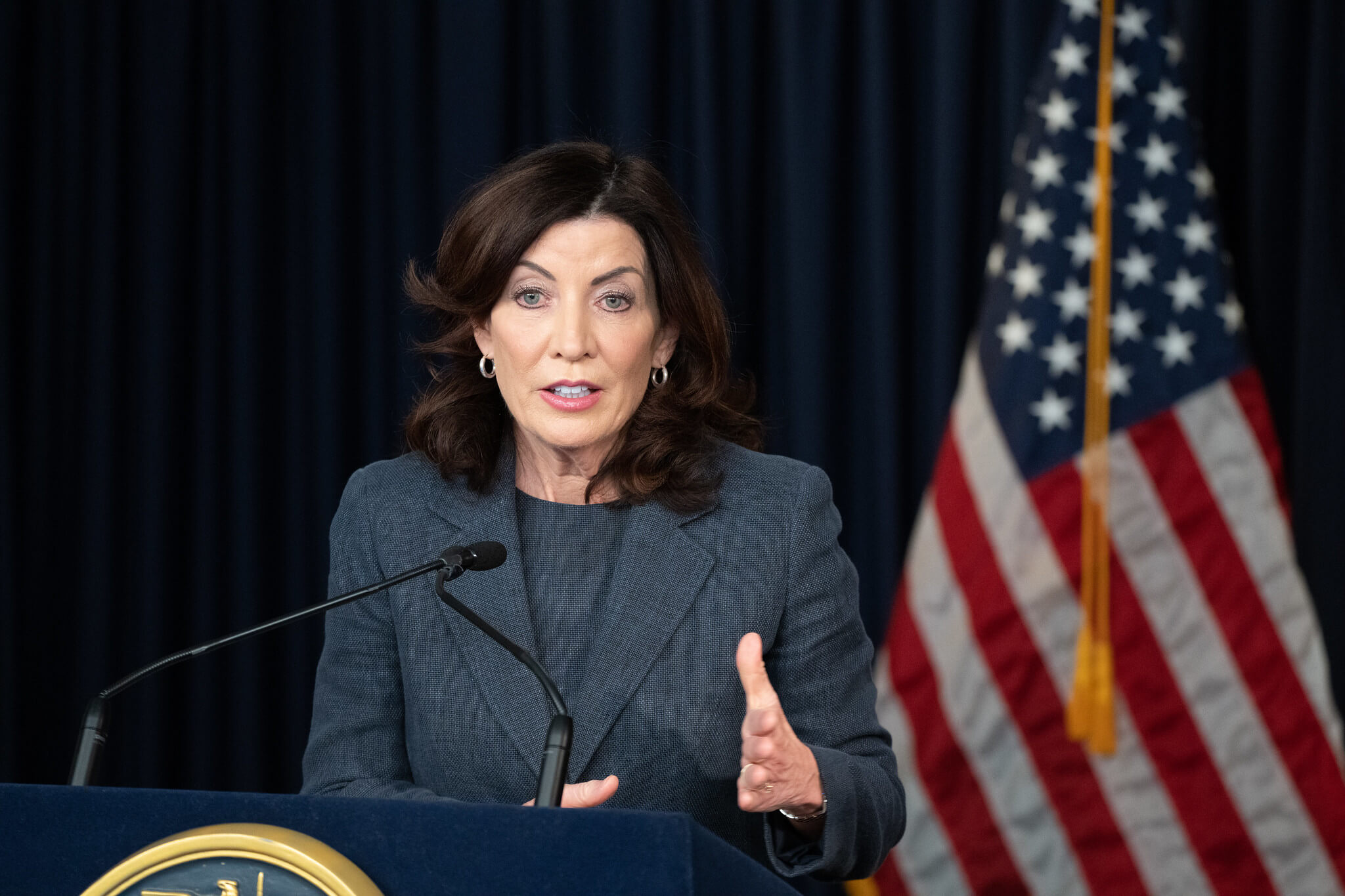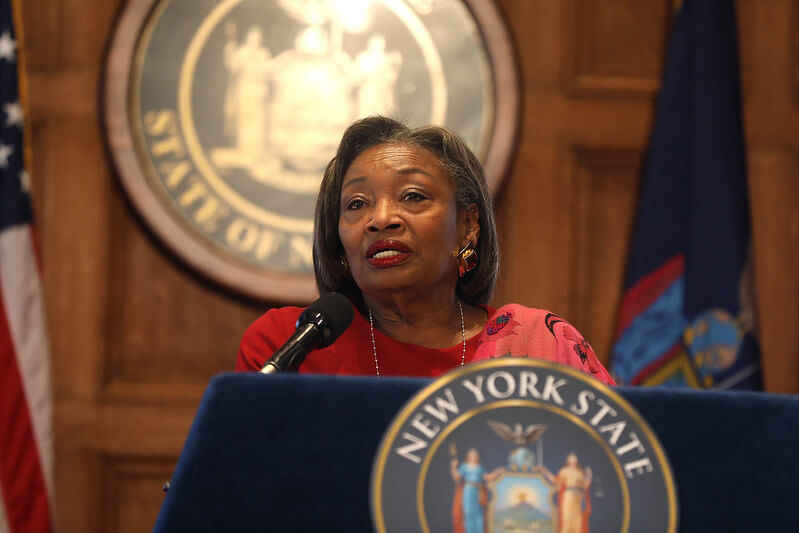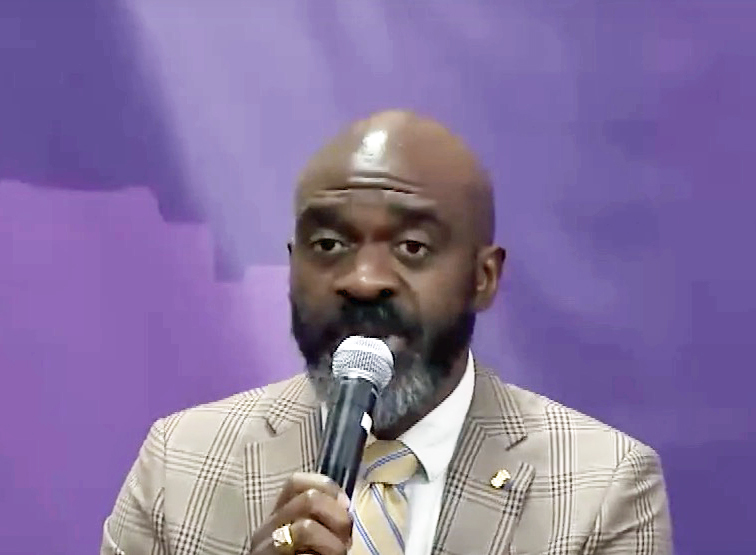Albany lawmakers, in their state budget proposals for the coming fiscal year released on Tuesday, rejected or tweaked some of the most notable priorities in Governor Kathy Hochul’s own spending plan, including her bids to further change the state’s recently reformed bail laws and remove the cap on new charter schools in New York City as well as key parts of her plan to boost housing production statewide.
The state Senate and Assembly’s budgets — known as one house bills — come several weeks after Hochul first unveiled her $227 billion Fiscal Year 2024 executive spending plan at the start of February and are expected to pass in their respective chambers this week. Assembly Speaker Carl Heastie, in an emailed statement to amNewYork Metro, said his chamber’s budget focusses on addressing “affordability issues” across the state.
“The Assembly Majority budget proposal offers a smart and fiscally responsible plan to move New York forward,” he said. “We are committed to addressing affordability issues head on in all aspects of our proposal so that we can continue to put New York families first. We are a diverse state, but everywhere I go New Yorkers tell me the same thing – they want to be able to live in affordable housing, have a good job, and raise their children to achieve even more.”
“This budget reflects these priorities and I know we can meet these expectations,” he added. “I am extremely proud of the hard work of our members in putting together this proposal and I look forward to working with my colleagues in the coming weeks to come to a final agreement with the Governor and the Senate.”
Disagreements between Hochul and the state legislature — where Democrats hold supermajorities in both chambers — on some of her key proposals set up what’s likely to be a nasty battle over the next three weeks, as a budget deal must be reached by April 1.
Although Hochul, according to published reports, appeared to indicate on Monday that she’s willing to blow past that deadline to get a budget that includes her top priorities.
A spokesperson for Hochul, in a statement, declined to weigh-in on the specifics of the state Senate and Assembly’s One House Budgets.
“Governor Hochul’s Executive Budget makes transformative investments to make New York more affordable, more livable and safer, and she looks forward to working with the legislature on a final budget that meets the needs of all New Yorkers,” a spokesperson said.
When it comes to bail reform, Hochul proposed eliminating what’s known as the “least restrictive standard,” which stipulates judges must consider the least restrictive means for getting defendants to appear for their court dates, in her budget.
The governor’s measure would tweak the state’s bail laws for the third time, since they were reformed in 2019 to eliminate cash bail for most misdemeanors and nonviolent felonies, with each change giving judges more discretion over which crimes are bail eligible.
Hochul argues the least restrictive standard creates confusion among judges in different parts of the state concerning which offenses they can and can’t set bail for.
But Senate Majority Leader Andrea Stewart-Cousins and Heastie have shown little appetite to make any more revisions to the bail laws, which was reflected in their budget proposals.
“The Senate intentionally omits the Executive proposal to amend New York State’s bail laws,” the Senate bill reads.
Katie Schaffer, director of advocacy and organizing at the Center for Community Alternatives (CCA) — a criminal justice group fiercely opposed to further bail law changes — lauded lawmakers for nixing the governor’s bail reform rollback proposal.
“We applaud our legislative leaders for rejecting Governor Hochul’s ill-conceived and dangerous proposal to weaken New York’s bail reform laws,” Schaffer said in a statement.
“New Yorkers deserve real solutions to create stronger and safer communities, not political ploys that will send more Black, brown and working-class New Yorkers to jail pretrial, increase wrongful convictions, and destabilize individuals and communities,” she added.
The legislature’s budget bills did include the Clean Slate Act, which would allow individuals with conviction histories to seal their records a certain number of years after sentencing, not including time they’re incarcerated.

State lawmakers also rejected Hochul’s gambit to lift the cap on new charter schools in the five boroughs by freeing up 85 previously unavailable charters and reissuing roughly 20 charters from schools that closed or had their licenses revoked — known as “zombie charters.” It’s not surprising Hochul’s plan to lift the cap was rejected, as many state Senate and Assembly lawmakers, such as both Stewart-Cousins and Heastie, are firmly opposed to charter schools.
Mayor Eric Adams also wasn’t a fan of lifting the charter cap, not because he opposes the publicly funded, privately run schools, but rather due to his administration’s estimate that adding up to 85 new charters would cost the city roughly $1 billion.
James Merriman, CEO of the New York City Charter School Center, blasted lawmakers for not including the cap in their budgets but expressed hope the governor’s proposal could still make it over the finish line before the legislative session wraps up in June.
“From Albany to NYC, thousands of New Yorkers have advocated for months to allow more public charter schools to open in NYC – but today, lawmakers in Albany missed another opportunity to support them,” Merriman said.
“Thankfully, the session’s not over, and common sense can still win,” he added. “We strongly urge them to listen to the voices of NYC families who want nothing more than an opportunity for their kids, and work with Governor Hochul to lift the regional cap and revive zombie charters.”
On housing, the state Senate and Assembly either rejected or modified many central pieces of Hochul’s sweeping plan to construct 800,000 new units statewide over the next decade — billed the “New York Housing Compact.”
That plan included setting regional housing production targets of 3% every three years for downstate — New York City and its surrounding suburbs — and 1% for upstate. Those municipalities that don’t meet their targets under the plan could face the state overriding local zoning rules and taking over the process.
Additionally, the plan included a $250 million “Infrastructure Fund” and $20 million “Planning Fund” to incentivize building in municipalities across the state.
Both legislative chambers’ budgets maintained Hochul’s housing targets, but removed the state’s ability to override local zoning rules and instead doubled the $250 million in incentives to $500 million.
Lawmakers also turned down Hochul’s bid to extend the 421-a affordable housing tax break, which expired last June, for developers who still have projects in the pipeline through 2030. Both Hochul and Adams have argued extending 421-a for projects in the pipeline and replacing it with a new tax incentive is crucial for getting developers to build much-needed affordable housing.
The budget bills did include support for a top priority of progressive housing advocates: so-called Good Cause Eviction legislation, which is designed to cap rent increases at 3% and prevent landlords from evicting tenants who don’t violate the terms of their leases.
“We are thankful that Speaker Carl Heastie and Majority Leader Andrea Stewart-Cousins have opened the door to negotiations on Good Cause – a bill that is long overdue and popular with New Yorkers in every region of the state,” said Cea Weaver, campaign coordinator of the Housing Justice for All Coalition, in a statement.
“But this budget is far from finished,” she added. “Now, Albany leaders must stand up to the real estate lobby to deliver a budget that truly works for New Yorkers.”
Read more: MSG CEO Sues Over Facial Recognition Dispute



































